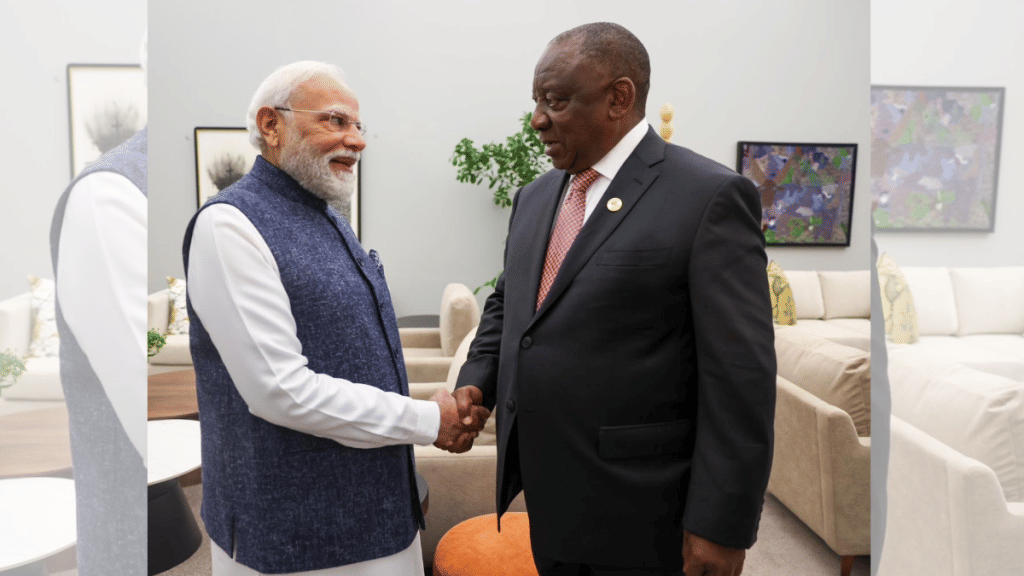The G20 Leaders’ Summit in Johannesburg, which concluded yesterday, marked yet another decisive moment in India’s diplomatic journey under Prime Minister Narendra Modi. What happened in South Africa was far more than a formal multilateral engagement. It was a clear demonstration of how India—once at the receiving end of global lecturing—has now become a power whose views shape outcomes, whose presence steadies the room, and whose leadership others seek out.
Modi arrived in Johannesburg with the weight of expectations—not just from India, but from the Global South, which increasingly sees him as the political voice capable of correcting long-standing global imbalances. By the time the summit closed, it was evident that India’s influence had expanded, not through coercive muscle but through clarity, conviction, and credibility.
At Johannesburg, Modi’s interventions carried a simple but powerful message: development cannot continue to be a victim of global geopolitics. In a world battered by conflict, inflation, and fragile supply chains, India pushed for a discourse that foregrounded food security, digital public infrastructure, climate finance, and equitable access to technology.
This was India at its best—practical, solution-driven, and inclusive. Modi reminded the G20 that global governance cannot be held hostage by great-power rivalry. The fact that his agenda found resonance across continents shows how deeply India’s diplomatic capital has grown.
One of the highlights of Modi’s participation was his push to scale India’s Digital Public Infrastructure (DPI) model globally. Countries across Africa, Latin America, and Southeast Asia expressed interest in partnering with India to build UPI-like payment systems, identity platforms, and inclusive digital services.
What’s striking is that India is no longer pitching ideas—it is offering proven platforms already benefiting over a billion people. At Johannesburg, Modi positioned DPI not as a technological boast, but as a pathway for nations to leapfrog poverty and bureaucratic inefficiency.

India held firm on climate equity and responsibility. Modi reiterated that climate transition cannot become a new form of economic colonialism where the developing world is forced to pay for the excesses of the West. His emphasis on green hydrogen partnerships, sustainable lifestyles, and climate finance found acceptance even among sceptical developed nations.
Modi offered partnerships—not sermons. That is what set India apart.
If the plenary sessions demonstrated India’s global weight, Modi’s bilateral meetings showcased the depth of trust he enjoys. His engagements with leaders from the US, France, Japan, UAE, Brazil, Nigeria, Indonesia, and South Africa reflected a simple truth: nations are increasingly seeking India’s partnership for stability, growth, and technological collaboration.
Whether it was defence co-production with the US and France, mineral supply-chain partnerships with African nations, or energy cooperation with Middle Eastern partners, Modi’s meetings were substantive and forward-looking. Even global leaders who may differ with India on certain issues 0
At Johannesburg, several leaders privately acknowledged that India’s presidency last year transformed the G20 into a more inclusive forum. Modi capitalised on that goodwill, pushing for reforms in global institutions and long-overdue representation for emerging economies.
His message was unmistakable: the Global South is not seeking charity—it is demanding fairness.
0What stood out most at Johannesburg was India’s role as a stabiliser. Amid global uncertainty—Ukraine, Middle East tensions, China-US rivalry—Modi projected calm, clarity, and confidence. His conversations did not avoid hard issues, yet they retained a tone of constructive engagement.
Increasingly, global leaders see India under Modi as a dependable, predictable, and principled power—rare qualities in today’s geopolitics.
The Johannesburg summit underscored a reality the world can no longer ignore: India is no longer just part of the global system; it is shaping it. Modi’s performance—marked by strategic clarity, diplomatic finesse, and an unwavering focus on development—reinforced India’s status as the voice of billions whose interests were long neglected.
As he concluded his interactions with world leaders, one conclusion was obvious. At the G20 table, India is not taking cues—it is setting the direction.





